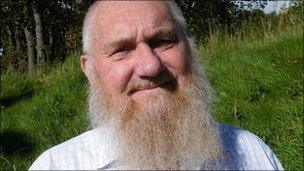Pleural plaque patient recalls asbestos snowball fights
- Published

Ron Marsh says he was exposed to asbestos at a locomotive works in the 1960s
The Supreme Court in London has ruled on the validity of Scotland's law on compensation for pleural plaque patients, backing the right of people in Scotland to claim damages.
One man told BBC Radio's Good Morning Scotland programme what it is like living with the condition.
"My first job was at the then British Rail works, at Saint Rollox in Glasgow," 70-year-old Ron Marsh explains.
"I was in and out of the factory, where they repaired steam locomotives, back in the 1960s."
Asbestos was widely used as insulation around pipes and boilers.
Because he worked in the office, not on the shop floor, there was always what Ron calls "a bit of banter" with the engineers.
"The floor was thick with dust, dirt, and asbestos," he says.
"They made snowballs out of asbestos dust, and we had little fights. We threw the snowballs at one another."
It was meant as a young man's joke.
But it meant the air was thick with asbestos fibres.
"I was handling the stuff. I was getting covered in it," Ron remembers.
'Breathless'
After leaving the works Ron did a number of different jobs but, he says, he never came into contact with asbestos again.
Ron Marsh says he was exposed to asbestos at a locomotive works in the 1960s
By the late 1990s, he started to notice problems.
"I got out of breath very easily. I was having more difficulty going up hills. I used to sail, but I found that I wasn't as good as my mates at pulling on the ropes.
"There was something not right."
Initial investigations couldn't find anything wrong. But in 2005 he had an X-ray for another, unrelated, health problem.
"The doctor said there's something in your lungs. It might be asbestos."
Specialists at a chest clinic in Aberdeen confirmed he had pleural plaques - which are effectively scars on tissue surrounding the lungs. They are linked to exposure to asbestos.
He initiated legal action for compensation. But the firm which took over responsibility for British Rail's historic liabilities, and their insurers, are contesting his claims.
'Benign condition'
The insurance industry has resisted making payments to pleural plaque patients because it argues that pleural plaques are nothing more than a marker that someone has been exposed to asbestos in the past.
The industry says pleural plaques are a benign "symptomless condition", and compensation should only go to people who have suffered actual damage.
Ron Marsh accepts that many people with pleural plaques live their whole life never knowing that they have them.
But, he says, having pleural plaques limits his physical ability.
He adds: "And it worries me that I have this. My family worry. And I worry that if I die early I'm leaving my family to fend for themselves."
- Published12 October 2011
- Published12 April 2011